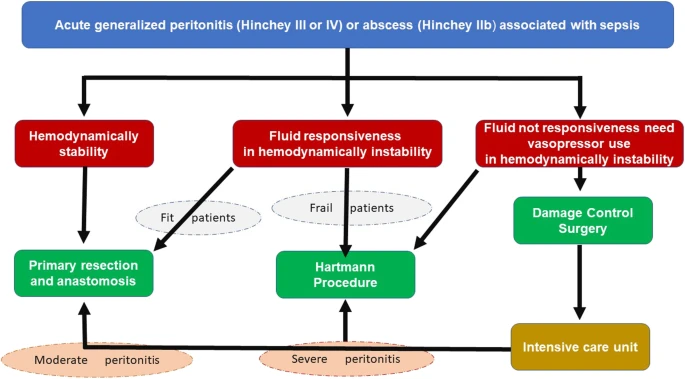colon
HInchey classification diverticulitis
Q) Management of Hinchey II diverticulitis is
a) Conservative
b) USG guided aspiration
c) CT guided aspiration followed by elective surgery
d) direct Surgery
Colorectal Liver metastasis
Q) All are negative prognostic factors in liver metastasis due to colorectal cancers except
a) Size more than 4.5 cm
b) Number of tumors more than 2
c) CEA more than 200
d) Tumor recurrence within 8 mths of primary surgery
Colon cancer genetics
False in Colo Rectal Cancer pathogenesis
a) APC mutation FOR Aberrant crytpt foci formation
b) KRAS for ACF to Early Adenom
c) DCC for Intermediate to Late Adenoma
d) P53 for Large Adenoma to CRC
Acute diverticulitis
Q) False regarding the management of Acute Diverticulitis, Sigmoid colon inflammation and Fat stranding in CT ?
a) Outpatient treatment in most cases
b) Do a colonoscopy after the resolution of acute symptoms
c) Elective Colectomy to be done
d) IV antibiotics to be started`
The pathogenesis of acute diverticulitis is often attributed to the obstruction of diverticula by fecaliths, leading to increased intraluminal pressure, bacterial overgrowth, and subsequent inflammation or perforation
Hyperbaric oxygen therapy for Radiation Proctitis
Q) A 60 year old male is contemplating hyperbaric oxygen therapy for radiation proctitis. Which of the following is not true regarding this?
A. Indicated in acute radiation proctitis but not in subacute or chronic radiation proctitis
B. Oxygen increases the growth of residual tumor and hence tumor should be completely
resected
C. Complications include Parkinsonism, barotrauma
D. Usually 30-40 sessions are required for treatment
Familial Adenomatous polyposis
Q. All are true about adenomatous polyposis syndrome except? ( Repeated in NOV INI SS)
A. 25% do not have family history
B. Attenuated FAP has less than 100 polyps and delayed onset (50-55 yrs)
C. More than 20 rectal polyps have to be operated as there is high risk of Carcinoma
D. Attenuated FAP don’t have extracolonic manifestations and carry APC mutation
[/s2If]
Malignancy in UC
Q. All are true regarding malignancy in UC except
A. Increased risk with pancolitis and increased duration
B. Screening for malignancy should start 8-10 yrs after onset of symptoms
C. Poorly differentiated
D. Surveillance should start as soon as remission occurs, to pick up missed colon cancer
FAP
Q) Which of the following is a type of Familial Adenomatous Polyposis
A. Garderner syndrome
B. PJS
C. Juvenille polyps
D. Hamartomatous polyp
